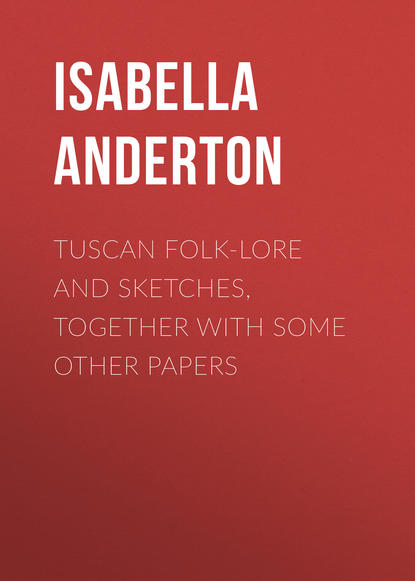По всем вопросам обращайтесь на: info@litportal.ru
(©) 2003-2024.
✖
Tuscan folk-lore and sketches, together with some other papers
Настройки чтения
Размер шрифта
Высота строк
Поля
The next morning the men went away, and Padre Ulivo accompanied them for some little distance on their journey, walking behind with one who was especially friendly.
“The one in front,” said this man, “the most important of us all, is Dominiddio[2 - We retain the unusual spelling “Dominiddio,” which is evidently intended to indicate the pronunciation of the Tuscan peasants.– Ed.] himself. Go and ask him a favour.”
So Padre Ulivo ran on, and threw himself on his knees in the road.
“What do you want?” said Dominiddio. “I will grant you whatever you ask for.”
“I want that anyone who sits down on my chair may be unable to rise without my permission.”
“Be it so.”
And Padre Ulivo returned to his companion.
“Have you asked a favour?”
“Yes, and it’s granted.”
“What did you ask?”
Padre Ulivo told him.
“Oh, you stupid man! But go and ask another favour quickly. And mind it’s something great, and something really for yourself. Remember you are speaking to Dominiddio.”
Padre Ulivo ran on again and knelt down.
“What do you want this time? You shall have it.”
“Let anyone who gets up into my fig-tree be unable to come down without my permission.”
“Very well; it shall be so.”
And Padre Ulivo came back leaping for joy.
“Well, and what did you ask for?”
Padre Ulivo told him.
“Oh, you fool! Go again, you will get one more favour; but mind you ask for something really good for yourself.”
He wanted him to ask to go to Paradise.
“Again!” said Dominiddio, when he saw Padre Ulivo in the dust before him. “Well, this is the last time. What do you want?”
“Let me always win at cards, no matter whom I may be playing with.”
“Be it so. And now no more.”
Padre Ulivo came back to his companion singing for joy.
“What have you asked for this time? Something really great?”
“Oh, yes,” said Padre Ulivo, and told him.
“Well, you’ve lost your chance now. Good-bye.”
With that he left him and Padre Ulivo went home.
Now his jolly times began again. His barrel of wine never ran dry, and his cupboard never grew empty. Everybody came to see him. They ate, drank, and led a merry life.
✴✴✴✴✴
But Padre Ulivo grew old; and one day Death came to him.
“Oh, how do you do?” said Padre Ulivo. “You want me, do you? Well, I was just beginning to fear you had forgotten me, and to wonder where you could be. Sit down and take a rest, and then I’ll come with you.”
So Death sat down on the chair in the chimney-corner, while Padre Ulivo piled on wood and made a splendid blaze.
“Now we must go,” said Death, when he was warm. “Oh, oh! what’s this?” For when he tried to get up the chair stuck to him and he could not move. “Oh, oh!” And he pulled at the chair that seemed glued firmly to him. “Padre Ulivo, let me go! I have to go for the carpenter’s daughter before sundown. Oh, oh! I can’t get up. You’ve bewitched me.”
“Promise not to come back for a hundred years, and you shall go free.”
“A hundred! A hundred and one, if you like! Only take the spell off.”
So Padre Ulivo gave him permission to rise, and Death went away.
✴✴✴✴✴
Things went on as usual for the hundred years, with feasting and merry-making. But at last, as Padre Ulivo was among his friends, Death appeared again.
“Yes, yes, I’m ready. But let us have a feast of figs first. See what splendid fruit there! I and my friends had as much as we wanted yesterday, it’s your turn to-day. Go up and help yourself; I am too old to climb.”
So Death went up the tree and picked and ate to his heart’s content.
“Now we must go,” said he. “Hullo! I can’t get down. Oh, Padre Ulivo, you’ve bewitched me again!” And he stretched out now an arm, now a leg, and twisted and turned; but it was all of no good, and the others stood below laughing at him.
“Oh, Padre Ulivo! I’ll leave you another hundred years, if you’ll only let me get down.”
“Very well; then you may come.”
So Death climbed down and went away.
✴✴✴✴✴
When the hundred years were passed, he came and stood outside the cottage.
“Padre Ulivo, Padre Ulivo, come out! I shan’t come near your house this time. I don’t want to be tricked again.”
“Oh, no, I’m coming. Wait till I get my jacket.”





